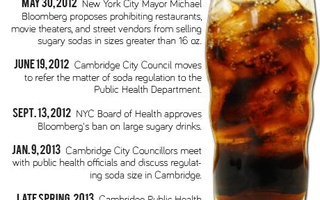As of Monday evening, the Cambridge City Council continues to engage in a crucial debate regarding a proposal to limit the size of sodas in the city. The policy in question has much in common with that of New York City’s Mayor Michael R. Bloomberg’s, which caps the size of sugary drinks to 16 ounces at movie theaters, restaurants, and mobile food carts. The Cambridge City Council is aware of the rather significant health benefits of such a ban as well as the supposed infringement on individual liberties. The Harvard Crimson Staff encourages the City Council to support the soda size limit because it is a sensible public health policy that addresses the serious problem of obesity while curbing the ability of corporations to market extremely unhealthy goods at extremely low prices.
It is widely acknowledged that the U.S. is one of the “heaviest” countries in the world. According to the Centers for Disease Control and Prevention, more than one-third of U.S. adults are obese. Furthermore, some of the leading causes of preventable death, including heart disease, stroke, type 2 diabetes, and certain types of cancer, stem from obesity. A single 20-ounce bottle of Coca-Cola contains 65 grams of sugar—nearly twice as much as the daily recommended value for men by the American Heart Association. When it is so clear that there is an evident health risk that can be ameliorated by implementing a smaller container for sugary beverages, public health officials have a responsibility to the American public to do so. The question arises, however, as to whether they do in fact have the authority to make such a decision on behalf of citizens.
Does the government have the authority to assign a standard number of seconds on crosswalk signals before individuals can walk? Does it have the authority to limit the amount of trans fat served in individual dishes at public restaurants? Or in Cambridge, is it justifiable that liquor stores cannot sell alcohol after 11 p.m.? Although these examples could all be considered limitations on individual autonomy, they highlight an overarching value system that prioritizes health and human life over the free market.
Moreover and most crucially, it is a myth that consumer choice drives demand for harmful, heavily processed products; rather, predatory marketing, misguided agricultural policy, and a number of other factors jointly conspire to determine the foods that Americans eat. Government policy does not limit individual freedom any more than the free market already does, and it is the duty of local government to begin to shift the public climate and expose those parties who are responsible for America’s public health crisis. A large soda ban would not threaten individual liberties, but it would go a long way to limit corporate power.
Although large soda bans are routinely mocked in popular culture, it is vitally important that we tackle an obesity epidemic that costs our nation billions of dollars each year. Policy reform at the local level is an important first step in doing so. We hope that the Cambridge City Council approves this proposal and paves the way for many more localities to follow suit.
Read more in Opinion
A Step ForwardRecommended Articles
-
 Put a Little OWAW Into Your J-Term
Put a Little OWAW Into Your J-Term -
Raise the RoofA few weeks ago, the White House expressed regret for then-Senator Obama’s vote against increasing the level of the federal debt limit
-
Admissions Office Says Not To Fret Over Common App Word LimitFor high school seniors completing the Common Application, the new 500-word limit on the personal statement can feel constraining and anxiety-provoking.
-
In Defense of the Soda BanIt takes courage to lobby for a bill that deprives people of their dietary freedom. Mayor Davis knows that democracy is not a popularity contest; it’s about being right and being right regardless of what the public thinks.
-
 Correlation Still Doesn't Equal Causation in Soda Studies
Correlation Still Doesn't Equal Causation in Soda Studies -
 Collaboration Lags on Soda Size Regulation
Collaboration Lags on Soda Size Regulation













